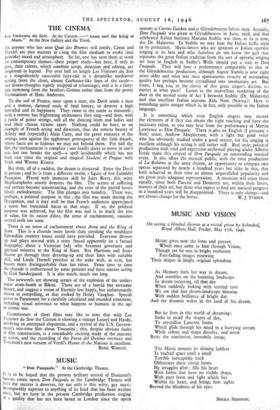MUSIC
"Don Pasquale." At the Cambridge Theatre.
IT is to be hoped that the present brilliant revival of Donizetti's famous comic opera Don Pasquale at the Cambridge Theatre will have the success it deserves, for not only is this witty, gay musie incomparably superior to anything of its kind that has been written since, but we have in the present Cambridge production singing of a quality that has not been heard in London since the opera seasons at Covent Garden and at Glyndebourne before 1939. Actually, Don Pasquale was given at Glyndebourne in June, 1938, and that celebrated Italian baritone Mariano Stabile was then, as he is now, the Dr. Malatesta. In Stabile we may hear the Italian buffo style in its perfection. Music-lovers who are ignorant of Italian operatic singing at its best and who therefore do not know the gulf that separates the great Italian tradition from the sort of operatic singing we hear in English at Sadler's Wells should pay a visit to Don Pasquale. They will hear a performance comparable to that of the Glyndebourne production, although Signor Stabile is now eight years older and what was once spontaneous vivacity of astounding quality has perhaps become crystallised into involuntary art. But listen, I beg you, to the clarity of this great singer's diction, IP) matter at what pace! Listen to the marvellous rendering of the duet in the second scene of Act I between Stabile (Dr. Malatesta) and that excellent Italian soprano Alda Noni (Norma)! Here is something quite unique which is, in fact, only possible in the Italian language.
It is something which even English singers may master the elements of if they can obtain the right teaching and have the necessary talent, as you may hear from the performance of Martin. Lawrence as Don Pasquale. There is also an English (I presume a Soot) tenor, Andrew Macpherson, with a light but good voice who has obviously studied under a good master, for his singing is excellent although his acting is still rather stiff. Real style, polished production with vital and expressive orchestral playing under Alberto Erede make this revival of Don Pasquale an outstanding musical event. It also offers the musical public, with the twin production of La Boheme at the same theatre, an opportunity to compare two operas separated by nearly a hundred years but alike in this, that both achieved in their time an almost unparalleled popularity and are given truly adequate representation. A musician will enjoy them equally, since both Puccini and Donizetti are, within their limits, masters of their art, but those who expect to find any musical progress in a hundred years will be disappointed. There is only-change—and


























 Previous page
Previous page